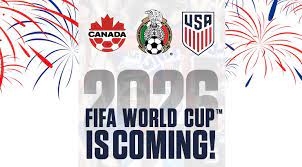In 2026 the US and Mexico will take the lead with their Canadian neighbours in hosting the World Cup. While the football people in those countries will have only a limited role in the organising (FIFA want to do everything themselves, it’s their ball apparently), to most people worldwide the perception will be that the countries are hosting.
Part of that global perception within the global football community will be tied up with how the national teams perform.
If the current results of the US and Mexican national teams are to be a guide, it could be a pretty dismal outcome for them. The traditional big dogs of the Concacaf confederation have both failed to get to the quarter finals of the Copa America, currently being played in the USA.
Instead, regional rivals Canada and Panama have qualified from the groups.
The recriminations and finger pointing have been quick to start in Mexico and the US who both fancy themselves as football superpowers. Frankly, with the resources, leagues and players they have, they should be.
But they aren’t and they look to be going the wrong way as the greatest show on earth heads for their countries.
Rather than look inwardly and analyse their own problems there has been a bubbling undercurrent, much of it in the local media, that points the blame at their regional confederation Concacaf with the feeling that it is not competitive enough.
Not big enough for their giant egos, perhaps. But bleating about competitiveness holds little attention or sympathy when you have just been well beaten – and somehow uncompetitive Canada and Panama did get through the groups to compete with South America and amongst the world’s best.
The view that Concacaf can’t provide enough good competition for its top nations is somewhat old school, oldie worldy. The reality is more likely that Mexico and the US are old school, stuck in their ways and systems that never really managed to compete head-to-head with the top Europeans and South Americans.
That isn’t Concacaf’s fault, it is their fault and that of their leadership. If they needed a slap in the face to wake up to the fact, they have just had it, and in their own backyard.
Both countries have thriving leagues, commercially at least. Both want to be sitting at the top of the football world with the kind of tenure and security they give their clubs in those leagues where there is no promotion or relegation. No jeopardy, never mind the discussion on sporting integrity.
In the past Mexico have had key players performing at the top level of the European game. At the current Copa America they have the most domestic players in their squad, bar Bolivia. Mexico have become more insular in their player development and selections.
The US have a different problem. A team based predominantly overseas (though too many are peripheral players at their clubs) has lost its mojo from their spectacular win of the Nations League in Las Vegas in 2022. But then with the return of Gregg Berhalter they have regressed rather than gathered momentum.
For Mexico it looks to be too late to put their issues right before 2026. Perhaps not for the US but they need to think very very hard about leadership as it is not working and everyone in the world can see it – even the American press are waking up to it.
Pretending it is Concacaf’s fault is not fault finding. After all Concacaf brought the Copa America to their back door that enabled them to find out they are actually in a bit of a pickle – if they hadn’t realised already.
Leadership is not just about coaching the team but needs goes higher up the corporate food chain, and there both federations may be missing a beat.
Compare the warm-ups to Copa America. Both the US and Mexico threw all their marketing effort at selling their pre-tournament warm-ups in the US. These games almost seemed to assume greater importance than the Copa America itself. It certainly took some of the sting out of its marketing to a US public that is growing in fandom but not necessarily well-versed in the international hierarchy of football competition.
Was the US’s spanking by Colombia and antiseptic draw with Brazil in pre-Copa America friendlies more meaningful than getting beaten by Panama and exiting the competition. Mexico similarly chased the cash of their friendly schedule in the US than the competitive priority of being world class ready.
Compare this to Canada who played warm-up friendlies against France and the Netherlands in Europe – outside their comfort zone and focussed on Copa America preparation. And they are a federation that is desperate for cash.
Mexico and the US need to wake up and face their realities, otherwise they could end up being the party poopers at their own party.
Paul Nicholson is the editor-in-chief of Insideworldfootball. Contact him at moc.l1744972657labto1744972657ofdlr1744972657owedi1744972657sni@n1744972657osloh1744972657cin.l1744972657uap1744972657

